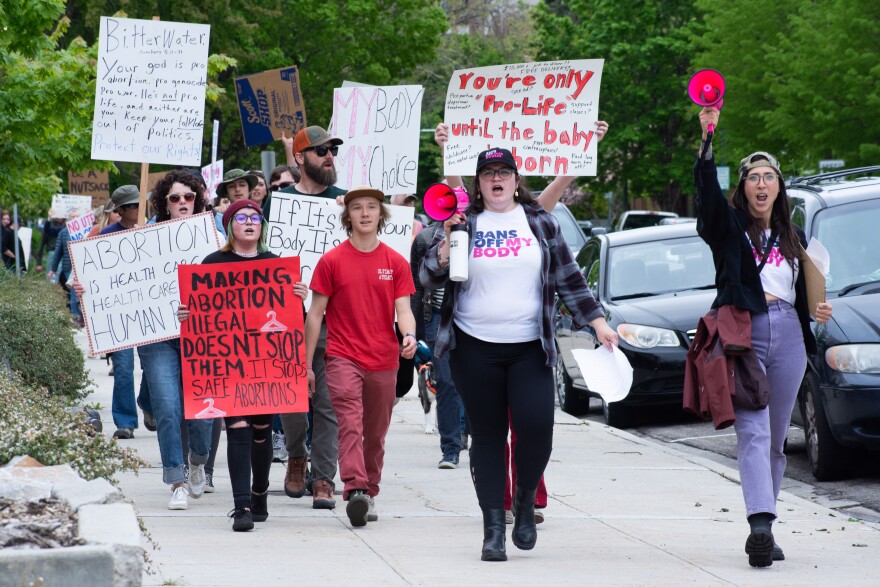Abortion in Idaho is now illegal in nearly every circumstance, capping a nearly 50-year legislative effort by state lawmakers to overturn the landmark 1973 decision in Roe v. Wade guaranteeing the right to an abortion in America.
The unofficial opinion from Justice Samuel Alito called the court’s previous ruling in the landmark 1973 case, Roe v. Wade, “egregiously wrong from the start.”
“Its reasoning was exceptionally weak, and the decision has had damaging consequences,”Alito wrote in the draft document leaked to Politico.
The Roe decision, along with subsequent rulings since then, have cemented the right to an abortion in all states prior to the fetus being able to survive outside the womb.
Recent abortion legislation show flashes of the past
In 2020, Idaho lawmakers passed, and Gov. Brad Little signed, legislation making nearly all abortions illegal, but it would only take effect if the U.S. Supreme Court returned oversight of abortion regulations to the states.
Exceptions would be made if the pregnancy threatened the life of a mother, or if a woman became pregnant through rape or incest. They would need to report the crime to police and provide a copy of the criminal report to an abortion provider to undergo the procedure.
However, advocates for survivors of sexual assault say those exceptions ring hollow since police reports aren’t generally available during an ongoing investigation.
Abortion in the United States wasn’t always illegal.An article published in the New York University Law Review in 1991 outlines how, under English common law, abortion wasn’t a crime until the mother could feel the fetus move – around 16-18 weeks.
Known as “quickening,” Connecticut was the first state to pass a criminal abortion statute in 1821 to enforce that standard, according to the article.
As medicine became more professionalized, doctors began a push to criminalize the practice. By the early 20th century, all states had outlawed abortions.

From nearly the moment Roe was decided, Idaho legislators have been trying to craft the state’s law to be “as restrictive as possible,” as described by Sen. Leon Swenson (R-Nampa) according to minutes from a 1973 Senate committee meeting.
Committee members at the time were warned by a representative from the Idaho Attorney General’s office that the state’s abortion law would likely be found unconstitutional because of the Roe decision.
The result, he said, could leave abortion “wide open” in Idaho.
Republicans in the House raised similar concerns.
Rep. Herbert Fitz (R-New Meadows) worried Idaho would become an “abortion mill” without updating its laws, according to committee meeting minutes.
Lawmakers also wanted to require the permission of the father of a fetus before a doctor performs an abortion.
Ultimately, the legislature passed, and Democratic Gov. Cecil Andrus signed, legislation not too dissimilar from the state’s 2020 trigger law.
While it allowed abortions in certain circumstances, it had its own trigger provision banning the procedure prior to 25 weeks of pregnancy if the U.S. Supreme Court reversed its own decision.
Cecil Andrus: "Hero" or "Sellout"?
Nearly 20 years later, in 1990, the National Right-to-Life Committee, which opposes abortion rights, lobbied heavily in Idaho for a bill it drafted that would’ve imposed the most restrictive law in the country.
Just about all abortions would’ve been outlawed under the bill. Survivors of rape could’ve received one, but they would’ve had to report the crime within seven days.
Andrus, who was serving a non-consecutive third term as governor, considered himself pro-life. But in a nearly 20-minute press conference announcing his veto of the bill, he said it went too far.
“The bill is drawn so narrowly that it would punitively and without compassion further harm an Idaho woman who may find herself in the horrible, unthinkable position of confronting a pregnancy that resulted from rape and incest,” Andrus said.
He said Idaho wouldn’t be a “patsy” for the National Right-to-Life Committee and get stuck with an expensive legal bill to pay for the defense of a law likely to be found unconstitutional.
“…you’d be foolish to spend the Idaho people’s money in that regard.”
The political ramifications, Andrus said, didn’t factor into his decision. He was campaigning at the time for a fourth term.
“That probably would’ve been the smart thing to do, but it would not have been the right thing to do and I have to live with myself,” he said.
Anti-abortion pressure builds
Since 1990, Idaho legislators have enacted more than a dozen laws modifying its abortion statute.
The state had to pay nearly half a million dollars after it lost a case defending a law requiring a parent’s permission for a minor to get an abortion in most circumstances. A federal court blocked another law passed in 1998 banning partial-birth abortions.
A 2010 law enacted without Gov. Butch Otter’s signature protected a healthcare worker from providing an abortion if it goes against their religious or moral beliefs.

In 2015, the legislature declared that prescribing drugs to induce an abortion over telehealth “…undermine[s] the creation of a healthy doctor-patient relationship,” calling it “substandard medical care.”
Two years ago saw the passage of the trigger law currently at play, and earlier this year,lawmakers passed their own Texas-style abortion ban that’s currently on holdpending a review by the Idaho Supreme Court. Oral arguments are scheduled for Aug. 3.
States Newsroom reported in April that the organization’s branch based in Portland could open a new clinic in Ontario, Ore., about an hour’s drive west of Boise. Otherwise, pregnant Idahoans in the Treasure Valley seeking an abortion would have to drive 250 miles one way to the next closest Planned Parenthood clinic in Walla Walla, Wash.
Follow James Dawson on Twitter @RadioDawson for more local news.
Copyright 2022 Boise State Public Radio




